
Days of Wonder is a board game publisher founded in 2002 and owned by Asmodee Group since 2014. Days of Wonder distributes its games to 25 countries. It specializes in German-style board games and has branched out to include some online games. Days of Wonder has published games in several languages including English, Dutch, French, German, Russian, and Greek. Days of Wonder was co-founded by Eric Hautemont, Mark Kaufmann and Yann Corno.

Zombies!!! is a tile-based strategy board game for two to six players. Zombies!!! won the 2001 Origins Award for Best Graphic Presentation of a Board Game, and Zombies!!! 3: Mall Walkers won 2003's Origins Award for Best Board Game Expansion.
Diamant is a multiplayer card game designed by Alan R. Moon and Bruno Faidutti, published in 2005 in Germany by Schmidt Spiele, with illustrations provided by Jörg Asselborn, Christof Tisch, and Claus Stephan.
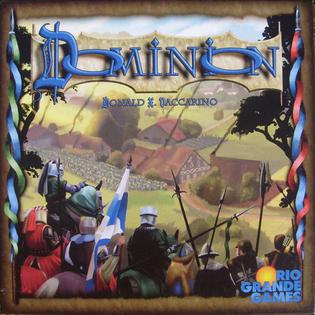
Dominion is a card game created by Donald X. Vaccarino and published by Rio Grande Games. Originally published in 2008, it was the first deck-building game, and inspired a genre of games building on its central mechanic.
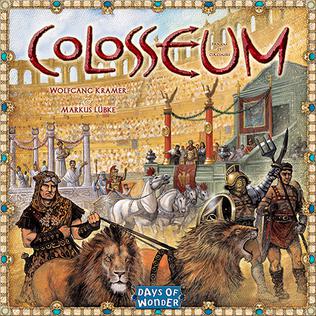
Colosseum is a board game by Markus Lübke and Wolfgang Kramer, published in 2007 by Days of Wonder and illustrated by Julien Delval and Cyrille Daujean. In the game, players attempt to attract the most spectators to the events in their arena.
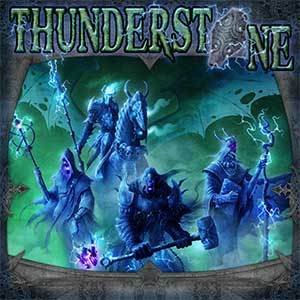
Thunderstone is a fantasy deck-building card game series designed by Mike Elliott, with artwork by Jason Engle. It was first published by Alderac Entertainment Group in 2009. Each card has dimensions of 6.3 cm x 8.8 cm. It has been translated into several languages.

Space Alert is a cooperative survival designer board game created by Vlaada Chvátil in 2008. Players assume the roles of space explorers on a mission to survey the galaxy. The crew is evaluated on teamwork and how they deal with problems that arise on their journey. Unlike most board games, in Space Alert, players need to make decisions and play cards in real time. It was given a special prize for "New Game Worlds" in the 2009 Spiel des Jahres awards.
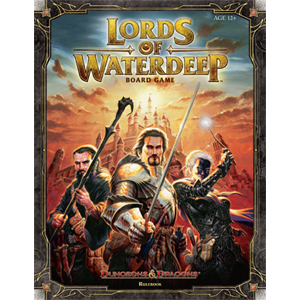
Lords of Waterdeep is a German-style board game designed by Peter Lee and Rodney Thompson and published by Wizards of the Coast in 2012. The game is set in Waterdeep, a fictional city in the Forgotten Realms campaign setting for the Dungeons & Dragons role-playing game. Players take the roles of the masked rulers of Waterdeep, deploying agents and hiring adventurers to complete quests and increase their influence over the city.

Mansions of Madness is a tabletop strategy game designed by Corey Konieczka and published by Fantasy Flight Games in 2011. Players explore a locale filled with Lovecraftian horrors and solve a mystery.

King of Tokyo is a monster movie-themed tabletop game using custom dice, cards, and boards, designed by Richard Garfield and released in 2011. A New York City-based edition, King of New York, was published in 2014. The game was re-released in 2016, with all-new artwork and characters.

Splendor is a multiplayer card-based board game, designed by Marc André and illustrated by Pascal Quidault. It was published in 2014 by Space Cowboys (Asmodee). Players are gem merchants of the Renaissance, developing gem mines, transportation, and shops to accumulate prestige points. Splendor received positive reviews and received numerous awards, including winner of Golden Geek Best Family Board Game. It was nominated for the Spiel des Jahres Game of the Year in 2014. The game also received a mobile application and an expansion released in 2017.
Evolution: The Origin of Species is a card game created by Dmitriy Knorre and Sergey Machin in 2010. The game is inspired by evolutionary biology. It was published by SIA Rightgames RBG. English, French and German game editions were published in 2011. Two or more players create their own animals, make them evolve and hunt in order to survive.
Castle Panic is a board game designed by Justin De Witt and published by Fireside Games in 2009 Castle Panic is a tower defense strategy game in which players work cooperatively to protect a castle from monsters. The game was a nominee for the 2010 Golden Geek Best Family Board Game.
Dead of Winter is a semi-cooperative survival strategy board game for two to five players designed by Jonathan Gilmour and Isaac Vega through Plaid Hat Games. The game is set in a post-apocalyptic, zombie-infested colony. Players are faction leaders who must work together to ensure the colony's survival through incoming zombies and lack of supplies. In addition, players have individual, secret win conditions that they must meet to be victorious.

Colt Express is a railway-themed family board game designed by Christophe Raimbault, Illustrated by Ian Parovel and Jordi Valbuena, published in 2014 by Ludonaute and distributed by Asmodee.

Love Letter is a card game introduced in May 2012 and designed by Seiji Kanai. Its first English-language edition was produced in the United States by Alderac Entertainment Group (AEG) until 2018, when Love Letter was acquired by Z-Man Games.

Hero Realms is a card-based deck building fantasy tabletop game, designed by Rob Dougherty and Darwin Kastle and published in 2016 by Wise Wizard Games. The game started out as a Kickstarter campaign in 2016. The goal of Hero Realms is to destroy your opponent or opponents by purchasing cards using "Gold" and using these cards to attack your opponent's "health" and their champions using your "combat" points or other powerful effects.

Star Wars: Rebellion is an asymmetrical strategy board game designed by Corey Konieczka and published by Fantasy Flight Games in 2016. The game's setting is inspired by the original Star Wars trilogy. Players control either the Galactic Empire or the Rebel Alliance. Each player pursues a different path to victory, with the Galactic Empire playing seeking to find the Rebel Alliance player's base and destroy it, while the Rebel Alliance player attempts to avoid detection by the Galactic Empire and sabotage their efforts. The game received highly positive reviews and won numerous awards.
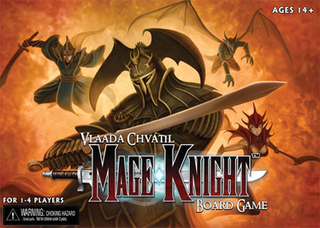
Mage Knight Board Game is a cooperative board game for 1 to 4 players designed by Vlaada Chvátil and released in November 2011. It is based on the related collectable miniatures game, Mage Knight. It has been rated as one of the top single player board games.
Decrypto is a 2018 espionage-themed party game designed by Thomas Dagenais-Lespérance and published by Le Scorpion Masque in which two teams of players attempt to decode three-digit codes using clues about secret numbered words and determine the secret words of the opposing team.















